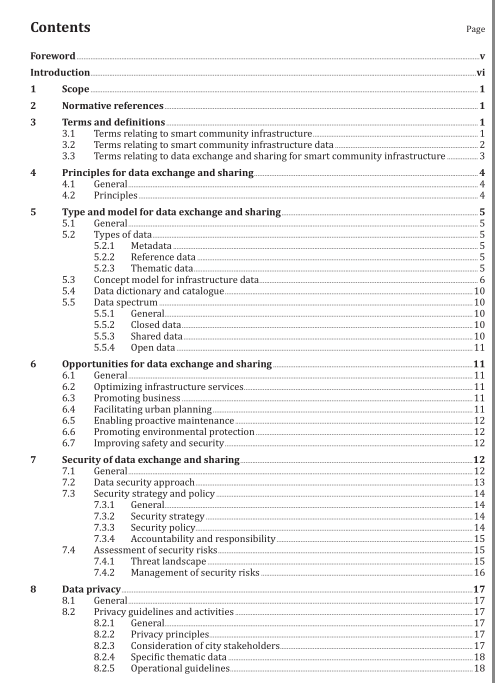ISO 37156:2020 pdf download.Smart community infrastructures — Guidelines on data exchange and sharing for smart community infrastructures
4 Principles for data exchange and sharing
4.1 General
This document shows the various possibilities for the use of data exchange and sharing for smart community infrastructures. The expectations of communities related to the outputs from and the use of data are often very high. However, it should be noted that there are many different constraints related on the range and validity of the outputs of data exchange and sharing. Examples are data reliability, availability, quality, complex relationships and temporal interpretation of data. Reasonable expectations should be set by smart communities related to the impact achieved as a result of the data exchange and sharing of community infrastructure data.
4.2 Principles
The following principles should be considered:
a) The community infrastructure data should be available to be exchanged and shared.
b) To be effective, the data should be of sufficient quality in order to be useful across smart community infrastructure services, or by more than one organization.
c) The data owner has the accountability and responsibility to ensure the exchange and sharing of the community infrastructure data is enabled.
d) The data creator should maintain the integrity of the community infrastructure data to be exchanged or shared.
e) The security and privacy of the community infrastructure data should be continuously preserved.
f) The data should use spatial methods to achieve the positioning and control of urban infrastructure objects.
g) The data should have temporal information to maintain changes to the community infrastructure for any reason, such as societal, environmental, cultural, strategic and policy changes. Temporal data allows timely interventions when required and supports the tracking of community infrastructure changes to enable smart management and efficiency improvements.
h) A systematic approach to the exchange and sharing of data should be taken, with every data attribute identifiable by a set of mechanisms to facilitate the interoperability of community infrastructures.
i) The city, in its role as the curator of the exchange and sharing of infrastructure data, should ensure that this activity is carried out in an equitable and ethical manner in order to ensure that all parties are treated equally.
5 Type and model for data exchange and sharing
5.1 General Smart community infrastructure includes energy, water, transport, ICT and waste services. The data addressed in this document are those related to the infrastructures and the built environment which support the community infrastructure.
The development and complexity of the smart community infrastructure and the planning, construction, operation, management and evaluation of the smart community infrastructure information services should be based on the construction, development and utilization of data resources. The data resources used should reflect the physical and operational conditions and interactions which are defined in ISO 37155-1. Data exchange and sharing takes place between different application services and systems for smart community infrastructure. Different types of data exchange and sharing use different data types and functions. The data framework for a smart city and community infrastructure is used to classify data as either metadata, reference data or thematic data.
The data framework details how current city data assets are transitioned from the existing siloed service provision to the interoperable use of data across the entire data lifecycle. The collective data assets relate to the data concepts specified in ISO/IEC 30182, and utilizes the classifications of open, shared and closed data within the data spectrum used by the community.
5.2 Types of data
5.2.1 Metadata Metadata are data which define basic information about data used to verify the provenance and validity of the data to be exchanged and shared. An example of metadata in a smart community data framework is the data relating to the voluntary services organizations who deliver city services on behalf of the city to citizens.
5.2.2 Reference data Reference data are any data which define the set of permissible values for the data which are to be exchanged or shared. For example, an atmospheric temperature reading at a certain location or video footage for a specific street which can be used for multiple purposes [41] .ISO 37156 pdf download.ISO 37156 pdf download
